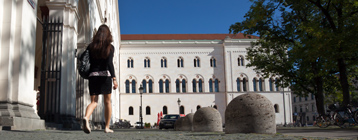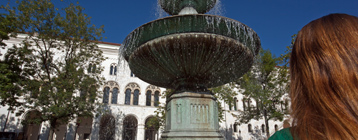International Students
Benvenuti – Bienvenidos – Bienvenu – 歡迎 – Laipni Lūdzam – Velkomme – Welcome – Welkom – Herzlich Willkommen!

We are delighted that you are considering the Faculty for the Study of Culture at LMU Munich (Ludwig-Maximilians-Universität München) for your study abroad!
The University is divided into 18 faculties and enjoys one of Germany’s finest library systems.
The Faculty for the Study of Culture has ERASMUS exchange agreements with 58 partner universities in many European countries. Worldwide links are fostered under the LMU exchange program and include 24 partner universities in Asia and two in Central America.
• Do you plan to apply to study in the Faculty for the Study of Culture at LMU and want to know if you are eligible? Please check first if your home university is one of our partner universities in ERASMUS countries and around the world. If you want to apply for a full time degree at LMU you will find useful information about the prerequisites and application procedure on the pages of the International Office. There you can also find scholarships for international degree students.
• Prospective students with a native language other than German are required to meet the German language requirements in order to be eligible for study at LMU Munich.
• Have you been selected by your home university to study at LMU Munich? Welcome to Munich! We are glad that LMU Munich is your university of choice!

Nominated Exchange Students (Incomings)
We support you on arrival and during your stay at our faculty. As you get started on your studies in the Faculty for the Study of Culture, we want to answer common questions, clarify general requirements, and provide useful links and contacts to help you in this process.
1. Contact information
2. Departments
3. Academic calendar
4. Language of instruction
5. German language courses
6. Types of classes
7. Course catalog
8. ECTS credits and grades
9. Transcript of records
10. Student support services
11. Student life in Munich
1. Contact information
ERASMUS Faculty Coordinator
Anna-Maria von Parseval, M.A.
Ludwigstraße 31 | Room 322
80539 Munich | Germany
Phone: +49 (0)89 2180-2578
erasmus12@dekanat.fak12.uni-muenchen.de
Appointments via E-Mail
LMU International Office Incoming Team
Ludwigstr. 27 | ground floor
Room G005 (Erasmus+) | Room G007 (LMUexchange)
Fax: +49 (0)89 2180 3136
erasmus-incoming@lmu.de
lmuexchange-incoming@lmu.de
Office hours:
Erasmus+ – Incoming:
Tuesday 9–11.30am
Wednesday 1–3pm
LMU exchange – Incoming:
Tuesday 9.30–11.30am
Wednesday 1–2pm
2. Departments
The Faculty for the Study of Culture covers the areas of ancient and modern cultures, an extremely wide academic field. The wide subject offering includes Archeology and Oriental Studies, as well as Asian Studies and Ethnology. The institutes are divided into two departments:
- Department of Ancient and Modern Cultures
3. Academic calendar
The academic year is divided into two semesters. Please consult the LMU Academic Calendar.
4. Language of instruction
The language of instruction in most study programs in the Faculty for the Study of Culture is German. You are expected to have at least CEFR B2 in German language, and a certificate is required to prove your qualification. Occasionally, lectures are offered in English. These can often be identified by the English language title of the course. The language of instruction is also indicated in the course catalog.
5. German language courses
In order to ensure that language difficulties do not hinder your academic progress, German is indispensable. Find out about preparatory and study-related German language courses.
6. Types of classes
To help you with the selection of your courses, we have provided a brief overview of the different types of classes/modules that are offered in the Faculty for the Study of Culture. Before choosing your courses, please read this preface carefully and familiarize yourself with the types of classes/modules.
If you have any questions please contact your ERASMUS Faculty Coordinator.
• Introduction to Academic Work | Einführung in die wissenschaftliche Arbeit
This course contains a general introduction to academic research methods (web research, libraries, quoting references) and techniques and strategies (how to prepare a written paper or give a presentation), and is offered in some disciplines. Introductory courses are highly recommended for exchange students.
• Lectures | Vorlesungen
Lectures are the classic teaching format at university and are usually given by professors. Discussion between the lecturer and the audience is unusual. Exchange students can attend any lectures in the orientation and basic modules.
• Seminars | Seminare
Seminars typically require all students to participate actively through reading, presentations (Referate), and/or discussion. In seminars, students usually have to hand in semester papers (Seminararbeiten), which are explorations of a topic that both student and lecturer have agreed upon. The lecturers inform students about possible topics and the semester paper requirements at the beginning of the semester. Exchange students who need a grade at the end of the semester should agree with the lecturers at the beginning of the seminar the form of examination and the expected deadline.
• Language courses | Sprachkurse
The Faculty for the Study of Culture offers a wide range of language courses open also to exchange students. The beginner’s level usually starts in the winter semester. Exchange students who are continuing in the summer semester, or who already have some knowledge of the language, may take the advanced course in the summer semester.
Please note that the exemplary language courses mentioned below cannot be guaranteed every semester:
Department of Asian Studies: Chinese for Non-Sinologists, Korean, Thai, Vietnamese, Mongolian, Japanese for Non-Japanese, Urdu/Hindi, Sanskrit, Classical Tibetan, Kannada, Tamil, Telugu.
Department of Ancient and Modern Cultures: Arabic, Hebrew, Turkish, Persian, Uzbek, Neo-Greek and the following source languages Akkadian, Hittite, Sumerian, Coptic, Middle Egyptian.
Additionally at the Institute of Social and Cultural Anthropology: Kiswahili, Indonesian, Nahuatl, Quechua, Nuu-chah-nulth ("Nootka"), Urdu.
• Tutorials | Übungen
Tutorials are always combined with a lecture or seminar and give students the opportunity to deepen acquired knowledge in practical exercises. Tutorials are not recommended to exchange students who are not proficient in the German language.
You should also be aware of these academic customs:
• Period per week | Semesterwochenstunde
Semesterwochenstunde, or SWS for short, is a term often heard in the context of the students' time budget. One SWS is one 45-minute teaching period per week over one semester or, more specifically, during the time when lectures, classes, etc. take place (Vorlesungszeit) in a semester. Usually, a course has two teaching units per week (2 SWS).
• An academic quarter | Akademisches Viertel
In German academic tradition, the beginning of a lecture is understood as "cum tempore" (Latin for "with time") or "c.t." for short. This means the session actually begins a quarter of an hour (therefore "akademisches Viertel") later, which gives students sufficient time to move from one room or location to the next. The addition "s.t." (sine tempore, Latin for "without time") means that the lecture will begin at the exact time.
7. Course catalog
In the online version LSF you will find a course schedule for all faculties and institutes divided per semester.
No login is needed. Simply click on "Faculty for the Study of Culture" (Fakultät für Kulturwissenschaften) and choose the institute in your field of studies. For details of each course (room, schedule, e-mail address of the lecturer, comments, etc.), click on the selected course.
The course catalog for the winter semester is available from about the beginning of August, while courses for the summer semester are online from the end of February. Please note that many courses are offered every year but not every semester (thus not in both winter and summer semesters).
If you need to know what kinds of courses are offered in your field of study before the new course catalog is published, for example in order to complete your Learning Agreement, please use the catalog from the previous winter or summer semester, which will give you an idea of the course offering.
The best way to register yourself for a course at the Faculty for the Study of Culture is to write an e-mail to the lecturer or get in contact with your departmental study coordinator. Here you can find the list of the Department’s Study Coordinators (StudiengangskoordinatorInnen).
You can also register personally by attending the first session of a course and enrolling directly with the lecturer. You will have the opportunity to discuss both your course selection and your Learning Agreement.
Please note: Exchange Students are not required to register themselves via LSF!
8. ECTS credits and grades
Credit for bachelor's and master's courses are given in accordance with the European Credit Transfer Scheme (ECTS). You can only be awarded ECTS credit points if you attend the examinations (e.g. oral presentations, written tests, essays) at the end of the courses.
As an exchange student you do not have to register online for examinations. You should speak with your lecturers early in the semester and agree to attend the examination.
As a general rule, 30 ECTS are awarded for a full semester and 60 ECTS for a year.
ECTS credits are awarded irrespective of the results achieved. Grades are given in accordance with the German grading system: 1 to 5, meaning "1" being "very good" and "5" having "failed".
Once you have attended your examination, please let your lecturer or study manager enter your grades and ECTS credits into LSF. You will be able to overview all the courses you selected and registered for, including grades and ECTS credits obtained.
9. Transcript of records
The transcript of records lists all course titles, accumulated ECTS credits and grades of the courses attended in the Faculty for the Study of Culture and will be issued at the end of the semester by the International Office.
Important: The transcript will not be issued automatically. Each exchange student is responsible for initiating his or her transcript process!
Please bring your ECTS Credit Form to the International Office before your departure. At the end of the semester, the International Office allocates special opening hours for issuing transcripts.
Erasmus – Incoming Team
Ludwigstr. 27 | ground floor
G005 (Erasmus+) | G007 (LMUexchange)
If your lecturers do not know the grades before your departure, please ask them to send their grades and the ECTS credits to the International Office by e-mail: erasmus-incoming@lmu.de
The necessary steps for obtaining a transcript of results are listed here.
10. Student support services
LMU Munich offers a wide range of services to exchange students as well as full-time students. Whether you need academic advice, or have social difficulties or financial worries, various support and counselling services provide direct and quick help.
11. Student life in Munich
There is more to life at LMU Munich than classes and seminars! Be part of the international student community and discover the vibrant Bavarian capital!

